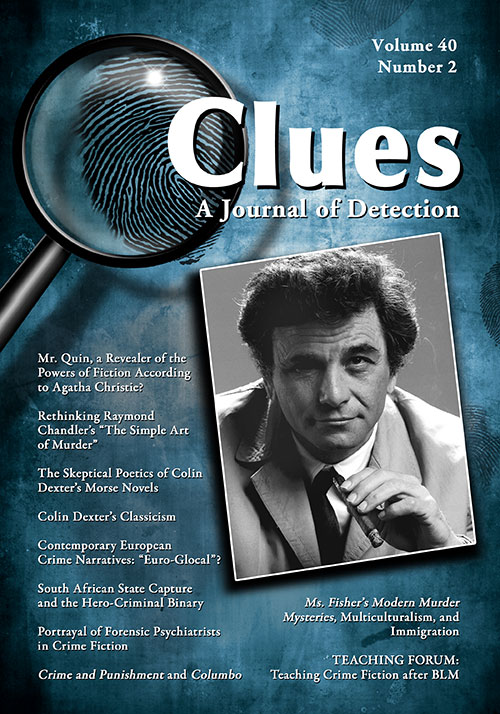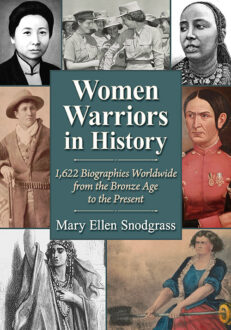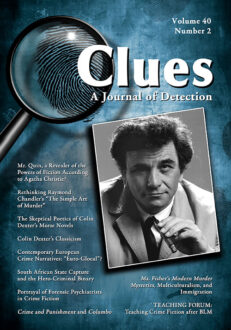Clues: A Journal of Detection, Vol. 40, No. 2 (Fall 2022)
Print Back Issue$30.00
In stock
About the Book
BACK ISSUE
This is a single back issue only. To order a current subscription, or for more information, please visit the journal’s web page at CluesJournal.com. Back issues from earlier volumes of Clues are available for order subject to availability. Also, single issues of the current volume may be ordered one at a time. Individuals may order back issues directly from our online catalog, and the charge for individuals is $30 (excluding postage). Issues from Volume 33 to the present are also available in ebook format on Kindle, Nook and Google Play.
The charge for single issues for institutions is $75 per issue (excluding postage). If your institution requires a back issue, please contact us to order at the appropriate rate.
About the Author(s)
Bibliographic Details
Executive Editor Caroline Reitz
Managing Editor Elizabeth Foxwell
Consulting Editor Margaret Kinsman
Format: softcover (7 x 10)
Pages: 145
Bibliographic Info: index
Copyright Date: 2022
ISSN 0742-4248
Imprint: McFarland
Table of Contents
Around the World Backwards and Forwards
caroline reitz 5
Caroline Reitz, the executive editor of Clues, provides an overview of the issue, including articles on Agatha Christie, Raymond Chandler, Columbo, Colin Dexter, contemporary European crime narratives, Fyodor Dostoyevsky, forensic psychiatrists in crime fiction, Deon Meyer, Ms. Fisher’s Modern Murder Mysteries, and a forum on teaching crime fiction after Black Lives Matter.
Rethinking Raymond Chandler’s “The Simple Art of Murder” (1944/1946)
stewart king 9
This review article revisits Raymond Chandler’s essay “The Simple Art of Murder” and examines its ongoing relevance for crime fiction studies. It asks to what extent does Chandler’s iconic essay help us to understand and explain the crime genre, both historically and today.
Intersecting Crime: South African State Capture and the Hero-Criminal Binary in Deon Meyer’s The Last Hunt (2019)
sam naidu 18
Deon Meyer’s The Last Hunt can be categorized as African noir in its themes of political disillusionment, corruption, and crimes of the state against its citizens, shedding light on contemporary African-European relations. The article examines the novel’s intersections of time, space, national, and transnational with criminal and detective characters, and the blurriness of the hero-criminal binary.
Contemporary European Crime Narratives: “Euro-Glocal”?
theo d’haen 29
The article makes a case for the emergence of a particularly European brand of crime fiction, film, and television series that fosters a closer European union.
“Mystery” Beyond Reason: Mr. Quin, a Revealer of the Powers of Fiction According to Agatha Christie?
marc vervel 39
The short story collection The Mysterious Mr. Quin has a special place in Agatha Christie’s work. In these stories where rational investigation opens up to the supernatural, Christie theorizes what is at stake in the desire to read and proposes an expanded conception of the detective story.
The Skeptical Poetics of Colin Dexter’s Morse Novels
michal sýkora 49
This article argues that Detective Chief Inspector Morse is a different figure in Colin Dexter’s novels than the popular television series. The author locates Dexter’s novels in British postwar crime fiction, with attention to representations of the social reality of Oxford and gender issues, and reads The Wench Is Dead to argue Morse’s hermeneutic approach to investigation reveals an ironic skepticism about truth.
Colin Dexter’s Classicism
matthew wright 59
Colin Dexter’s Inspector Morse books, unlike any other detective novels, are saturated with references to Greek and Latin language and literature. This article explores the significance of Classics and classical scholarship in Dexter’s world and argues that the novels present a consistent (and consistently troubling) view of education and culture.
“What’s the Point of the White Australia Policy?” Ms. Fisher’s Modern Murder Mysteries, Multiculturalism, and Immigration
melissa beattie 69
The period drama Ms. Fisher’s Modern Murder Mysteries, set during the period of the White Australia policy, frequently addresses Australia’s relationship with immigration and immigrant communities. This article analyzes the series’ interaction with contemporary discourses about multiculturalism, immigration, and the role of British culture in Australia.
Portrayal of Forensic Psychiatrists in Crime Fiction: Analyzing Representations, Their (Fictional) Ethical Issues, and Implications
susan hatters friedman, md 80
This essay explores the challenges of creating characters in crime fiction that are forensic psychiatrists. Forensic psychiatrists work at the interface of mental health and criminal law, and appropriate representations can both lend authenticity to crime fiction as well as potentially help to destigmatize mental illness.
Crime and Punishment and Columbo: The Inverted Mystery, the Everyman, and Investigation by Rhetoric of Inquiry
christyne berzsenyi 92
In their hit television series Columbo, Richard Levinson and William Link pay homage to Dostoevsky’s Crime and Punishment, showing the commission of the crime first and revealing the villains’ motivations and cover-ups. The brilliant St. Petersburg Magistrate Porfiry Petrovitch and LAPD’s Lieutenant Columbo present their personae with excessive displays of friendliness, self-deprecation, rhetorical questioning, and the false exit.
TEACHING FORUM: Teaching Crime Fiction after BLM
The Novel and Not the Police
theodore martin 105
The author describes his attempt to design and teach a crime fiction class relevant to our era of racial criminalization and mass incarceration. The resulting class sought to de-center the detective novel and de-emphasize genre coverage, and instead invited students to explore the more varied ways that novels have responded to American ideologies of crime and criminal justice.
The Death of Dukhi Chamar
shampa roy 108
The essay examines how a pedagogic practice centered around reading Munshi Premchand’s “Sadgati” (Deliverance, 1931) in terms of crime and justice rather than as a sentimentalized narrative of a poor man’s suffering can draw attention to its limits in adequately exploring issues related to caste.
Race and American Detective Fiction in the Contemporary Classroom
nicole kenley 111
This essay discusses teaching novels by Raymond Chandler and Walter Mosley as a strategy for helping students connect American racial politics from the 1940s and 1990s with their contemporary world and the Black Lives Matter movement.
Teaching in Tumultuous Times: The Case of Edgar Allan Poe
sami atassi 113
In the wake of public demands for justice and calls for institutional reforms, studying Edgar Allan Poe’s fictional detective, C. Auguste Dupin, can provide a corrective model to the cold confines of academic inquiry that tends to treat life like an academic affair.
Somebody That I Used to Know: Reading Gendered Silences in the Sherlock Holmes Canon
tom ue 116
This article attends to the silenced women in some of Arthur Conan Doyle’s Sherlock Holmes stories and recommends ways that students might be encouraged to think about them and respond to them ethically and imaginatively.
Investigating Privilege: Teaching Race, Gender, and Intersectionality Through the Lens of Crime Fiction
charlotte beyer 119
The author explores how intersectionality, race, and feminism can be taught through using traditional and contemporary crime fiction in the diverse undergraduate classroom. Examining the relationship between privilege and crime portrayed in the crime genre, the author seeks to nurture an inclusive teaching and learning space where crime fiction can illuminate contemporary cultural debates.
Holy Quarantine, Batman! Teaching Reflections on BLM, the Global Pandemic, and the World’s Greatest Detective
garret l. castleberry 123
An introduction to comics studies class evolved into a platform for identifying genre conventions in urban crime superhero fiction in the context of both the pandemic and social anxieties relating to the BLM movement. The author examines how the initial crime fiction emphasis on Batman grew into a dialogic reflection concerning BLM and other crime-adjacent social topics in the initial months of the coronavirus global pandemic.
REVIEW ESSAY
Agatha Christie and Hercule Poirot: The Greatest Mystery Writer and the Greatest Fictional Detective of All Time?
marty s. knepper 127
BOOK REVIEWS
Samuel Saunders. The Nineteenth Century Periodical Press and the Development of Detective Fiction.
clare clarke 131
John Billheimer. Hitchcock and the Censors.
annika r.p. deutsch 133
Lisa Hopkins. Burial Plots in British Detective Fiction.
kathryn hendrickson 134
Clues Index, Volume 40 137
Author Guidelines are on page 145.
Book Reviews & Awards
- “Clues is a must-have for readers and writers of crime fiction. Scholarly, thought-provoking, wide-ranging in its topics, Clues covers the crime and thriller map.”—Sara Paretsky
- “A. Conan Doyle, notoriously resentful of Sherlock Holmes’s success, liked to scorn ‘police romances’ as less significant and worthy of his talents than his other literary work. If he could have read Clues, the thinking mystery reader’s journal, he would surely have felt differently—and learned much he never realized himself about even his own landmark contribution to the genre, from which so much else by others has flowed.”—Jon Lellenberg, U.S. agent for the Arthur Conan Doyle estate
- “I love reading Clues. Every issue provides thought-provoking, well-researched articles. The variety and scope of the material found in Clues makes an unparalleled, ongoing contribution to our understanding of the role of crime fiction in our culture, and the genre’s reflection of its time and society.”—Jan Burke, Edgar-winning author of The Messenger (2009)
- “Clues is an important journal. It carries the torch of tradition that is the backbone of detective fiction. It goes below the surface and gets to the heart of what makes the genre so fascinating and valid today”—Michael Connelly, author of the Harry Bosch novels, including The Overlook (2007)
- “for erudite and fascinating truths about mysteries, follow the clues to Clues, the scholarly journal that is an essential resource for every serious student of the mystery”—Carolyn Hart, author of Death Walked In (2008)
- “with scholarship ranging from Poe to Peters, nothing beats Clues”—Joan Hess, author of Mummy Dearest (2008).





